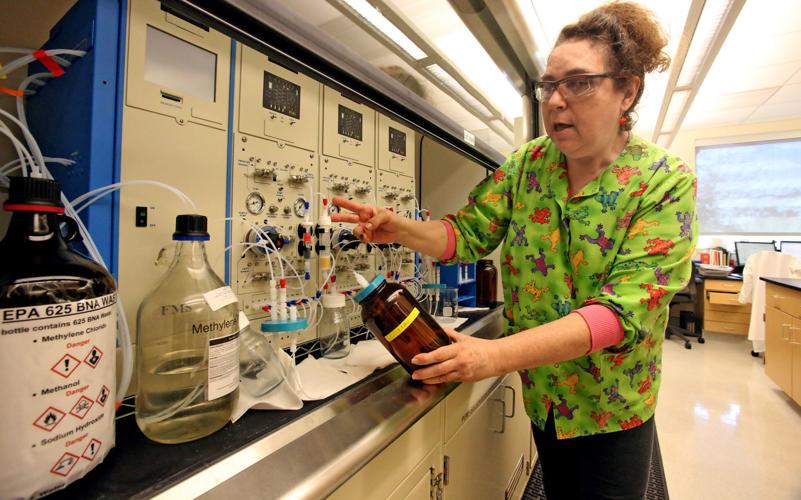Offer someone a cup of water and they may turn it down. Put some beer up for grabs, and there won’t be a dry throat around.
That thirst for suds is what Jeff Prevatt is banking on to entice Arizonans to drink treated wastewater by using it to brew beer.
He wants to use beer to address water scarcity issues in Arizona and win the Water Innovation Challenge.
Prevatt is the team leader for a project proposed by the Southwest Water Campus, a coalition of water utilities and water service companies. His team is one of five finalists fighting for a “New Arizona Prize” of $250,000 to turn its water-sustainability proposal into reality.
The group’s entry aims to bring awareness to water scarcity in the state and to introduce a new use for “potable reuse” water — wastewater that’s been thoroughly treated to become drinkable.
The main obstacle to overcome, Prevatt said, is the “yuck factor” people associate with reclaimed wastewater, which is sometimes known as “toilet to tap.” He said the water is clean and drinkable, and that the perception that it is dirty or unsafe is “only in your head.”
“All water should be judged by its quality, not its history,” he said. “We can treat water right now to any quality that you desire.”
Special batches of beer
Prevatt’s team will find out on Thursday, Nov. 3 if it wins the competition — and the grant. If it does, the plan is to load small-scale water-treatment equipment onto a huge truck and drive it around the state next summer.
The mobile facility will process water at municipal water treatment plants. Some of that water will be dropped off at breweries and some will be bottled and handed out to the public.
Craft breweries in Arizona will use the potable reuse water to brew special batches of beer, and then face off in a competition to become the tastiest toilet-to-beer-tap brew in Arizona.
The Southwest Water Campus has partnered with the Arizona Craft Brewers Guild to connect with breweries across the state, said Rob Fullmer, the guild’s executive director.
“People have problems drinking their own tap water, but I think they would drink beer with any water that’s being deemed safe,” he said.
The Southwest Water Campus includes the Pima County Regional Wastewater Reclamation Department, Tucson Water, the town of Marana, the University of Arizona, Carollo Engineers, CH2M, Clean Water Services and Water Reuse. The group’s proposal focuses on shattering the stigma that surrounds recycled water by presenting it in a form that’s harder to turn down — beer.
The New Arizona Prize is sponsored by the Arizona Community Foundation, Republic Media and ASU’s Morrison Institute for Public Policy.
Catalyst for change
Water is central to the brewing industry. It takes about six or seven pints of water to brew one pint of beer, Fullmer said.
He and Prevatt have been coordinating with local craft breweries, and Fullmer said they’ve reached out to about 12 in Tucson so far, including Dragoon Brewing Co.
Dragoon manager Tristan White said he was intrigued by the project and that the brewery may participate because he thinks everybody could be a little more responsible when it comes to water.
“One of the reasons that we were drawn to it is because we live in a desert, and we’re keenly aware of the water shortage situation in this state,” White said.
Beer, he said, is a good way to introduce people to potable reuse for two reasons. Craft breweries are culturally popular right now, and brewing was historically a way to make water safe to drink.
“Hops have antimicrobial properties, and then alcohol kills almost all pathogenic” bacteria, White said.
The alcohol and low pH of the beer, as well as the high temperatures reached during the brewing process, all work together to sanitize the water.
“I think everyone’s going to be drinking potable reuse at some point in the next 10 years,” White said. “We’re happy to look into ways that we can get ahead of it.”
Prevatt, too, sees potable reuse as inevitable. We might have been drinking it sooner, he added, if not for a prohibition on drinking reclaimed water put in place 30 years ago.
Technology has vastly improved since then, and now the Arizona Department of Environmental Quality is considering making it legal. Prevatt said the Southwest Water Campus has already received permission from ADEQ to serve up potable reuse water and beer if the group wins the grant — or even if it doesn’t.
Prevatt, regulatory compliance manager at Pima County’s Regional Wastewater Reclamation Department, said the group still wants to go forward with the project if they lose, but will work locally with treatment plants and breweries in Southern Arizona.
The project will help design potable reuse regulations in Arizona.
“We’re kind of a pilot for the state,” Prevatt said. “It’s not just a fun project to win this contest.”
Arizona could see new legislation regarding potable reuse as early as 2017, he said, and water treatment facilities could be ready to produce drinkable reclaimed water within 10 years.
Prevatt said Pima County used to discharge treated wastewater rivers when he started working there over 20 years ago, disposing of it “like trash.”
“Now, you don’t throw aluminum and cardboard away; you recycle it,” he said. “We shouldn’t be disposing of water; we should be putting every drop to use.”
The Environmental Protection Agency has campaigned for years to make recycling mainstream. Prevatt hopes that this project will lead to serious discussions about making potable reuse the norm.
“Beer, it gets people talking,” Prevatt said.






